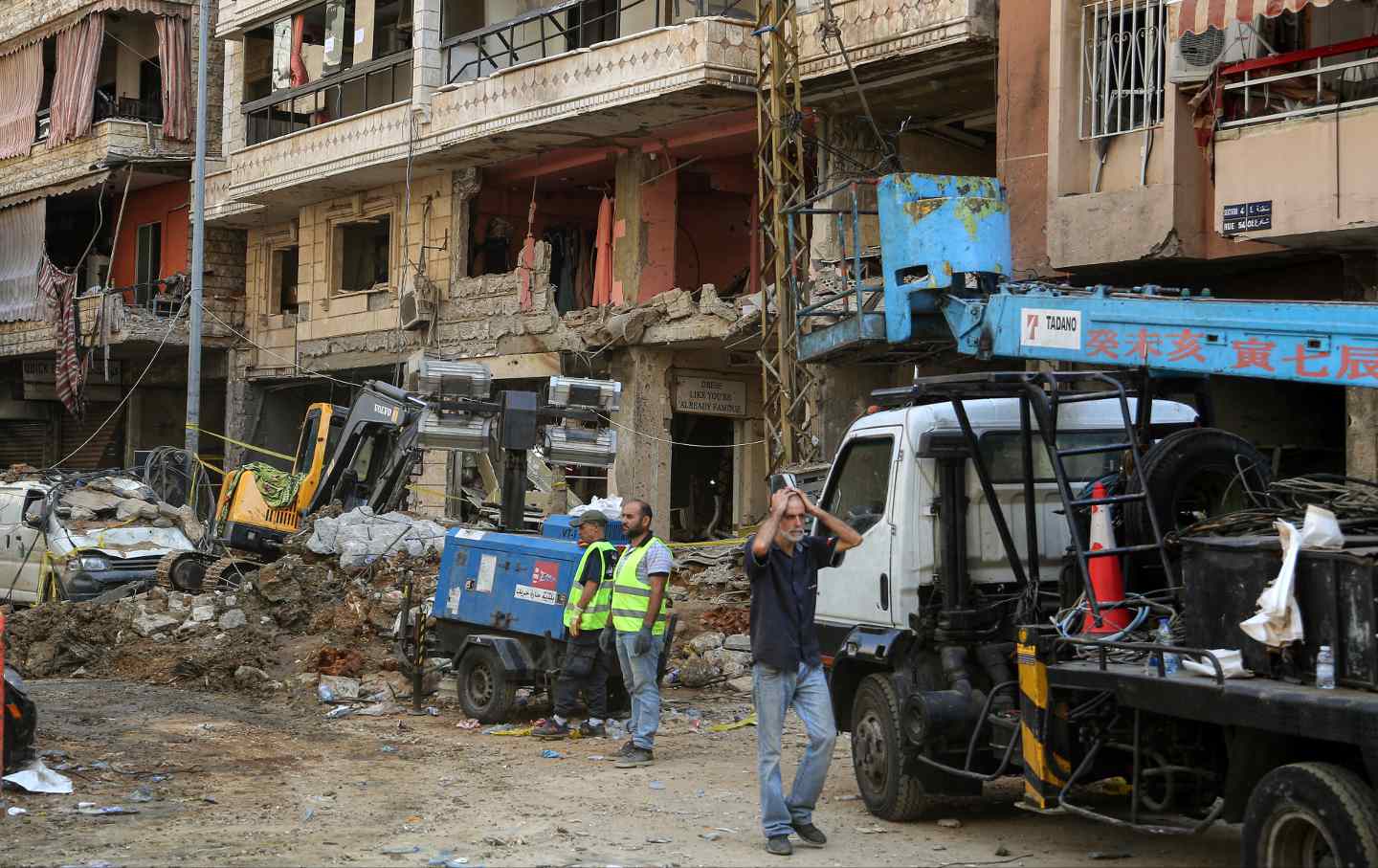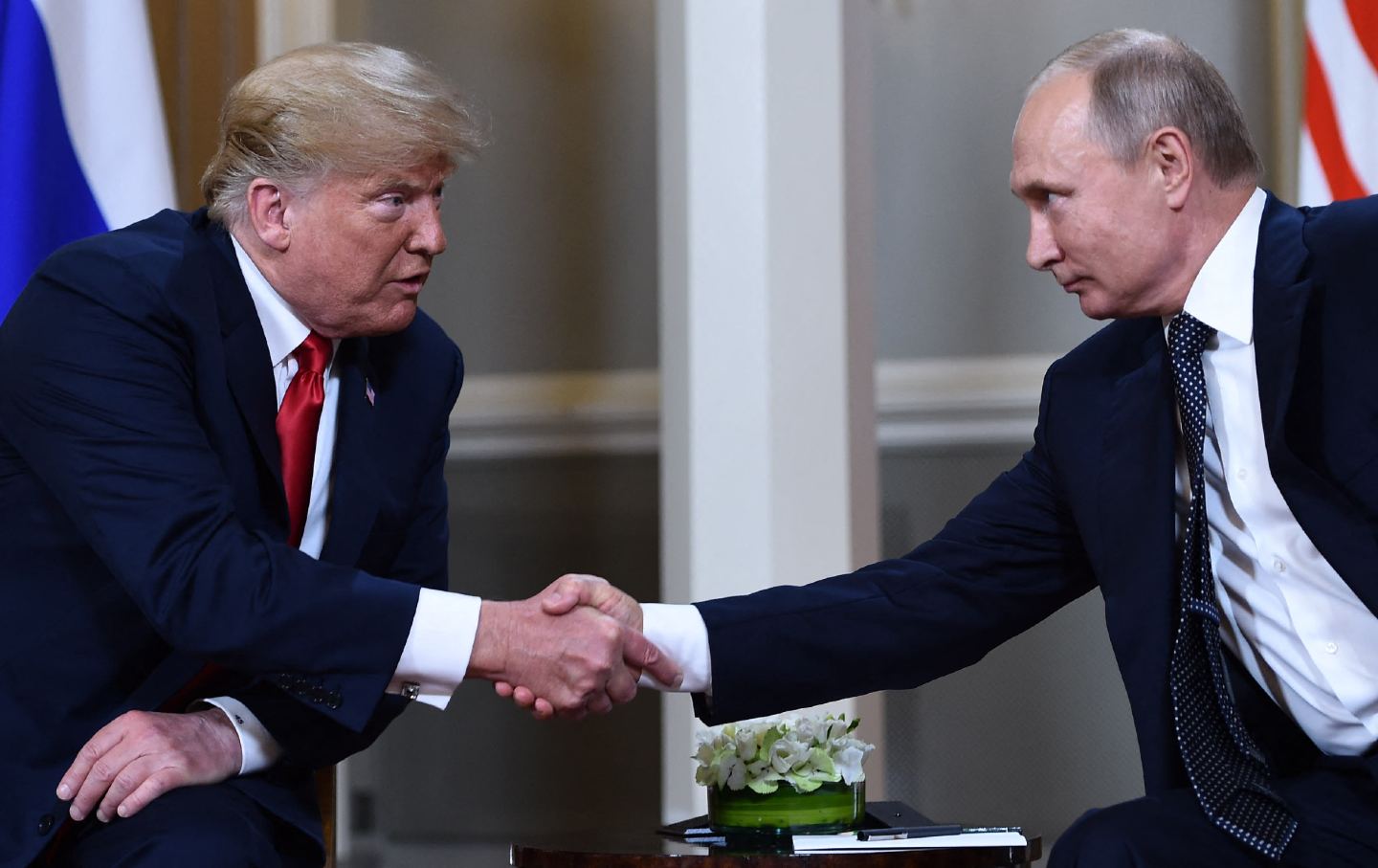Israel’s Terrorist Attacks Have Unleashed Hell in Lebanon
With air strikes now increasing the bloodshed, there’s no telling how much worse things could get.

A Lebanese man reacts to the destruction after an Israeli air raid attack in Beirut’s southern suburbs.
(Marwan Naamani / picture alliance via Getty Images)At around 3:30 pm local time last Tuesday, Israeli intelligence services launched a mass, simultaneous attack inside Lebanon the likes of which has never been witnessed before in the history of modern warfare. Thousands of pagers, all secretly packed with plastic explosives, were detonated remotely with the notification of a message sent by the bomb-makers.
In an instant, almost 3,000 people were injured, and over 10 were killed, among them children and healthcare workers. They were shopping in grocery stores, walking on the street, driving in cars. Some were working in hospitals, others were at home with their children. While many were in the south of the country, many others were in the southern suburbs of Beirut, miles from the front lines where Israel and Hezbollah have been trading fire.
No sooner had the hospital system of Beirut been completely overwhelmed with thousands of simultaneous life-changing, disfiguring maimings, when Israel initiated another mass attack on Lebanon the following day.
More explosives, this time hidden in walkie-talkies, were detonated, seemingly timed to coincide with a mass funeral for a child and a hospital worker who had been killed the day before, exploding in the hands of Hezbollah guards while mourners were packed together in the crowds. Walkie-talkies, like pagers, are also used by medical workers, and explosive-laden devices were found in ambulances in Beirut as well as in the homes of emergency responders in southern Lebanon.
In the past, Israel has used explosives planted inside communication devices like cell phones to assassinate its opponents, such as Hamas bomb-maker Yahya Ayyash, but those were aimed at specific targets, people who could be tracked on their own before the explosives inside were detonated. Israel and its defenders have attempted to describe last week’s mass attack as a similarly surgical operation against Hezbollah fighters. This is a lie.
Blasts occurred regardless of where their targets were, who had them in their possession, and who was caught in the radius of the explosions, many of which took place in densely populated areas. Members of Hezbollah were killed, but so were workers in hospitals, where pagers are still commonly used.
Even that was not enough; two days later, Israel carried out massive air strikes in the suburbs of Beirut. Again, Israel described its attack as a pinpoint mission against Hezbollah fighters. Again, it lied. The attack did not come in a targeted strike, as it later came to be described in the media, but rather involved the complete destruction of an entire residential block. Whole families remain missing and under the rubble, with relatives scrambling for any information about their loved ones, while the IDF takes a victory lap in front of the press.
And on Monday, Israel escalated even further, pounding southern Lebanon in a bombing campaign that, as of this writing, has killed nearly 200 people and injured nearly 800. The specter of an all-out war looms larger with each passing minute.
For those in Lebanon, this past week has been one long, earthshaking tragedy, one that has shocked a nation that after decades of conflict has built up resiliences to events that would grind other societies to a halt. Israel’s attacks have made Lebanon’s citizenry terrified of the devices they hold in their hands, paranoid about the compromised systems of distribution that enter their country, and fearful of a full-scale invasion by Israel, which has shown over the past 11 months that it recognizes no boundaries in war, only yet-to-be-realized opportunities.
The intent of this operation was undeniable to anyone present in Beirut last week, as I was: to strike terror, to inject fear, and to foment unrest. But despite the target’s being so clearly psychological, and the potential implications of such an attack for the future of warfare, mainstream media organizations and Western politicians could not hide their joy. Israel was back to doing what it does best: being the scrappy military underdog, the main character in the spy novel, the faithful ally that one runs out of superlatives to describe.
New York Times columnists raved about “one of the most precisely targeted strikes in the history of warfare,” while its reporters described an “eye-catching demonstration of Israel’s technological prowess.” British news channels joked about “Israel calling” and spoke of a “spectacular coup you would read about in a thriller.” Israeli journalists, having even fewer expectations of neutrality, posted about this being the “funniest and happiest day” in the aftermath of October 7.
Even the same New York Times, which was quick to boast of the mastery of the operation, elsewhere described the attacks’ intentions as being “more psychological than strategic” and said they may have held little purpose in the grand scheme of the war, considering the “price in our shared sense of vulnerability.” But still, many outlets refused to actually follow these observations to their inevitable conclusion: that this was an act of terror, one meant for the civilian population rather than its ostensible military target. Most of the references to terrorism could be found in places like the South China Morning Post, made for countries that were not the primary bankrollers of Israel’s impunity or audiences who were the major supporters of Israel’s war. (One notable exception: former CIA director Leon Panetta, who told CBS Sunday Morning, “I don’t think there’s any question that it’s a form of terrorism.”)
When the inevitable news of the deaths of children made their way into the halls of power and Western newsrooms, officials and talking heads were quick to squash the questions of the attack’s morality. Representative Brad Sherman described the civilians harmed as being the result of “Hezbollah’s use of…human shields and their use of soldiers when [sic] age 18.” The identities of the children, who were not teenagers but a little boy and a little girl in their own homes, were clearly unknown to him. When these children’s circumstances too could not be ignored, they were dismissed on Israel and British channels as simply collateral damage, something that could not take away from such a stunning, staggering success. Other Times articles described civilians as simple “noncombatants [who] were also drawn into the fray,” and The Atlantic instead chose to not refer to civilians at all, describing the thousands wounded as simply “thousands of [Hezbollah] fighters.” Anything to avoid the difficult conversations and get to the good part.
Americans have delighted in a new way to taunt their perceived enemies, those who see Arabs as human beings. A political cartoonist and Detroit News staffer depicted Rashida Tlaib, the only Palestinian American in Congress, as having a pager that exploded on her desk. Backers of Israel have added pager emojis to their X handles to indicate their delight. When walking by Code Pink protesters who asked her about the 8-year-old and 11-year-old who had been killed in the explosions, Representative Harriet Hageman joked, “Do you have your pagers with you?”
The mass maimings and disfigurements of countless Lebanese were never going to be the concern of Israel’s supporters. Children, nurses, and doctors, held sacred in Western countries, were given no such humanization if they had the misfortune of being cursed with Arab blood. They are all instead potential terrorists, secret terrorists, collateral damage, unfortunate human shields caught in a mysterious and impenetrable crossfire. The potential Pandora’s box of this operation has gone almost entirely unaddressed by those who backed it to the hilt: an entire import system intercepted by a foreign backer, explosives planted inside personal communication devices, and distributed en masse without detection on multiple fronts.
The consequences of this development in warfare, and the potential usage by America’s adversaries who now see the door flung wide open, have taken a back seat. Everyone from Leon Panetta to Edward Snowden is warning of the vast implications of this attack for the future. They are not to be listened to. This is simply a time for joy. Innocent non-Israelis have had their faces mangled, their hands destroyed, their family lines cut. The social fabric of an entire country has been frayed, the psyches of millions pushed to the brink, and this is seen as a massive success.
While Israel has attempted to maintain deliberate ambiguity as to its responsibility for this attack, there is no other actor in the region that has this capability or this kind of impunity. Amid the months of increasing tensions on the Lebanese border, the United States has attempted to claim that it is trying to avoid war while still, like in Gaza, giving Israel everything it could possibly want. Officials are now going so far as to claim that Israel is attempting to head off conflict via “de-escalation through escalation,” that these massive attacks are not meant to instigate war but rather to avoid it, with the assumption that Israel wants peace being self-evident.
But Israel does not want peace. We are closer than we have been in decades to a full-scale war in Lebanon, as the IDF begins warning Lebanese people to evacuate from homes near Hezbollah sites and cabinet ministers speak in specific terms about depopulation and buffer zones.
Popular
“swipe left below to view more authors”Swipe →Conversely, we have never been further away from the United States seeming to care about ending the conflict—something that is within its power—with the White House instead content to give up and let the next president, whoever that may be, figure things out. What may come of all of this is someone else’s problem. The seeds of destruction have been planted in another garden without a single bead of sweat. God knows its vines could never reach into ours.
We cannot back down
We now confront a second Trump presidency.
There’s not a moment to lose. We must harness our fears, our grief, and yes, our anger, to resist the dangerous policies Donald Trump will unleash on our country. We rededicate ourselves to our role as journalists and writers of principle and conscience.
Today, we also steel ourselves for the fight ahead. It will demand a fearless spirit, an informed mind, wise analysis, and humane resistance. We face the enactment of Project 2025, a far-right supreme court, political authoritarianism, increasing inequality and record homelessness, a looming climate crisis, and conflicts abroad. The Nation will expose and propose, nurture investigative reporting, and stand together as a community to keep hope and possibility alive. The Nation’s work will continue—as it has in good and not-so-good times—to develop alternative ideas and visions, to deepen our mission of truth-telling and deep reporting, and to further solidarity in a nation divided.
Armed with a remarkable 160 years of bold, independent journalism, our mandate today remains the same as when abolitionists first founded The Nation—to uphold the principles of democracy and freedom, serve as a beacon through the darkest days of resistance, and to envision and struggle for a brighter future.
The day is dark, the forces arrayed are tenacious, but as the late Nation editorial board member Toni Morrison wrote “No! This is precisely the time when artists go to work. There is no time for despair, no place for self-pity, no need for silence, no room for fear. We speak, we write, we do language. That is how civilizations heal.”
I urge you to stand with The Nation and donate today.
Onwards,
Katrina vanden Heuvel
Editorial Director and Publisher, The Nation
More from The Nation

Warning From the Past Warning From the Past
In a new film, journalists confront a dictator.

The Case Against Joe Biden for Complicity in Genocide The Case Against Joe Biden for Complicity in Genocide
The ICC has applied for an arrest warrant for Benjamin Netanyahu. But Israel’s assault on Gaza has been made possible by US support.

Gazans Heard Trump's Promises. Now They Want Him to Keep Them. Gazans Heard Trump's Promises. Now They Want Him to Keep Them.
Trump made a direct pitch to end the war on Gaza. The people still living there were listening.

The Fallout of Biden’s Middle East Policy Is Now Trump’s Responsibility The Fallout of Biden’s Middle East Policy Is Now Trump’s Responsibility
In Trump’s hands, the country's diplomatic strategy in the Middle East can only get worse.

The New Face of British Conservatism is Black—and Female The New Face of British Conservatism is Black—and Female
The London-born daughter of Nigerian parents presides over the ruins of 14 years of Tory rule. Can her brand of nativism-lite bring the party out of the wilderness?



